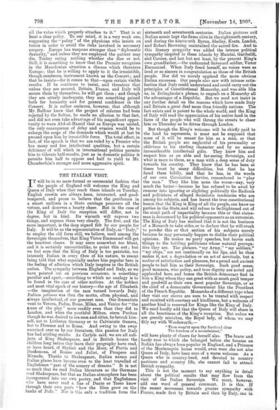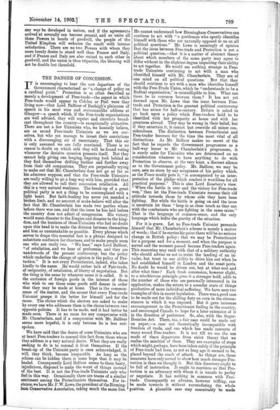THE ITALIAN VISIT.
IT will be in no mere formal or ceremonial fashion that the people of England will welcome the King and Queen of Italy when they reach these islands on Tuesday. English crowds are always keen, interested, and good- tempered, and prone to believe that the gentleman in a smart uniform in a State carriage possesses all the virtues, and deserves a hearty cheer. But in the case of the King of Italy the reception will differ, not in degree, but in kind. Its warmth will express two things, and express them very clearly. The first, and the more important, is the deep regard felt by our people for Italy. It will be as the representative of Italy, as " Italy," to employ the old form still, we believe, used among the Sovereigns themselves, that King Victor Emmanuel will get the heartiest cheers. It may seem somewhat too blunt, and it is certainly uncourtierlike, to point this out ; but we feel sure that the King of Italy is too patriotic, too intensely Italian in every fibre of his nature, to resent being told that what especially makes him popular here is the feeling of affection which Italy inspires in the British nation. The sympathy between England and Italy, as we have pointed out on previous occasions, is something peculiar and apart,—something to which no analogy is to be found in the case of other nations. At the noblest and most vital epoch of our history—the age of Elizabeth —the imagination of the race turned towards Italy. Ita2iara petimus was then the motto, often physical, and always intellectual, of our greatest men. Our dramatists went to Verona, Padua, Rome, Milan, and Venice for "the scene of the play " more readily even than they did to London, and when the youthful Milton, stern Puritan though he was, desired to see men and cities, he betook him- self, not to Lutheran Germany or to Calvinistic Geneva, but to Florence and to Rome. And owing to the sway exercised over us by our literature, this passion for Italy has had abiding results. As Carlyle said, we are all sub- jects of King Shakespeare, and in British homes the children long before they learn their geography have read, or have heard, of Shylock and the Moor, of Portia and Desdemona, of Romeo and Juliet, of Prospero and Miranda. Thanks to Shakespeare, Italian names and Italian places have become even to the least travelled of Englishmen " part of the scenery of dreams." It is not so much that we read Italian literature as the Germans read Shakespeare, but that an Italian atmosphere has been incorporated into our own poetry, and that Englishmen who have never read a line of Dante or Tasso know through their own poets "how the lilies grow on the banks of Italy." Nor is this only a tradition from the sixteenth and seventeenth centuries. Italian pictures and Italian music kept the flame alive in the eighteenth century, and during the nineteenth Byron, Shelley, Keats, Lander, and Robert Browning maintained the sacred fire. And to this literary sympathy was added the intense political sympathy inspired in these islands by Mazzini, Garibaldi, and Cavour, and last but not least, by the present King's own grandfather,—the undaunted Savoyard soldier, Victor Emmanuel. When Italy freed herself, no voices were so loud or so sincere in congratulation as those of the British people. Nor did we merely applaud the more obvious Italian successes. Our people also saw with intense satis- faction that Italy could understand and could carry out the principles of Constitutional Monarchy, and was able like us, in Bolingbroke's phrase, to engraft on a Monarchy all the advantages of a Republic. But we need not insist in any further detail on the reasons which have made Italy and Britain a great deal more than friendly nations. The fact exists and is patent to the whole world, and the King of Italy will read the appreciation of his native land in the faces of the people who will throng the streets to cheer him on Thursday as he drives through London.
But though the King's welcome will be chiefly paid to the land he represents, it must not be supposed that none of it will be meant for him as a man, or that the British people are neglectful of his personality or oblivious to his sterling character and by no means inconsiderable intellectual gifts. They know him and respect him as an able and far-seeing Sovereign, and what is more to them, as a man with a deep sense of duty towards his country. They know that he has been at times beset by many difficulties, but that he has faced them boldly, and that he has, in the words of our own Coronation Service, remembered to "play the man." They like him none the worse—nay, very much the better—because he has refused to be awed by rumour into ignoring or slighting politically the Radicals and politicians of alleged Socialistic tendencies who are among his subjects, and has learnt the true constitutional lesson that the King is King of all the people, can know no parties in the State, and will refuse to be frightened out of the strait path of impartiality because this or that states- man is denounced by his political opponents as an extremist. The King of Italy has realised that it is not the business of a Monarch to take sides, or to declare that he will crush to powder this or that section of his subjects merely because he may personally happen to dislike their political opinions. He makes no party speeches, but leaves such things to the battling politicians whose natural preroga- tive they are. The phrases, " my Army," " my soldiers," "my ships," are not continually on his lips, and he thus makes it, not a degradation or an act of servitude, but a matter of satisfaction and pleasure, for a proud and ancient people to hail him as their Sovereign. Such good sense, good manners, wise policy, and true dignity are noted and applauded here, and hence the British democracy find in him a King whom they can greet with as much good temper and goodwill as their own most popular Sovereign, or as the chief of a democratic Government like the President of the French Republic. Monarchs of a different type when they visit our shores are sure to be treated with respect and received with courtesy and kindliness, but a welcome of another kind is reserved for Kings like the King of Italy. We need hardly add that the Queen of Italy will share in all the heartiness of the King's reception. But unless we are greatly mistaken, the Royal lady, of whom we may fitly say with Wordsworth,— "Thou wear'st upon thy forehead clear
The freedom of a mountaineer," will have plenty of cheers for herself also. The brave and hardy race to which she belonged before she became an Italian has always been popular in England, and a Princess of the Montenegrin house would, even were she not also Queen of Italy, have been sure of a warm welcome. As a Queen who is country-bred, and devoted to country pastimes and country life, she cannot fail to attract British sympathy. This is not the moment to say anything in detail about the political results that may flow from the visit of the Italian Sovereign. We must, however, add one word of general comment. It is this. If the recent movement towards greater sympathy with France, made first by Britain and then by Italy, can in any way be developed in unison, and if the agreements arrived at severally can become general, and so unite all three Powers in bonds of goodwill, the people of the United Kingdom will welcome the result with intense satisfaction. There are no two Powers with whom they more keenly desire to stand well than France and Italy, and if France and Italy are also united to each other in goodwill, and the union is thus tripartite, the blessing will not be double but threefold.















































 Previous page
Previous page